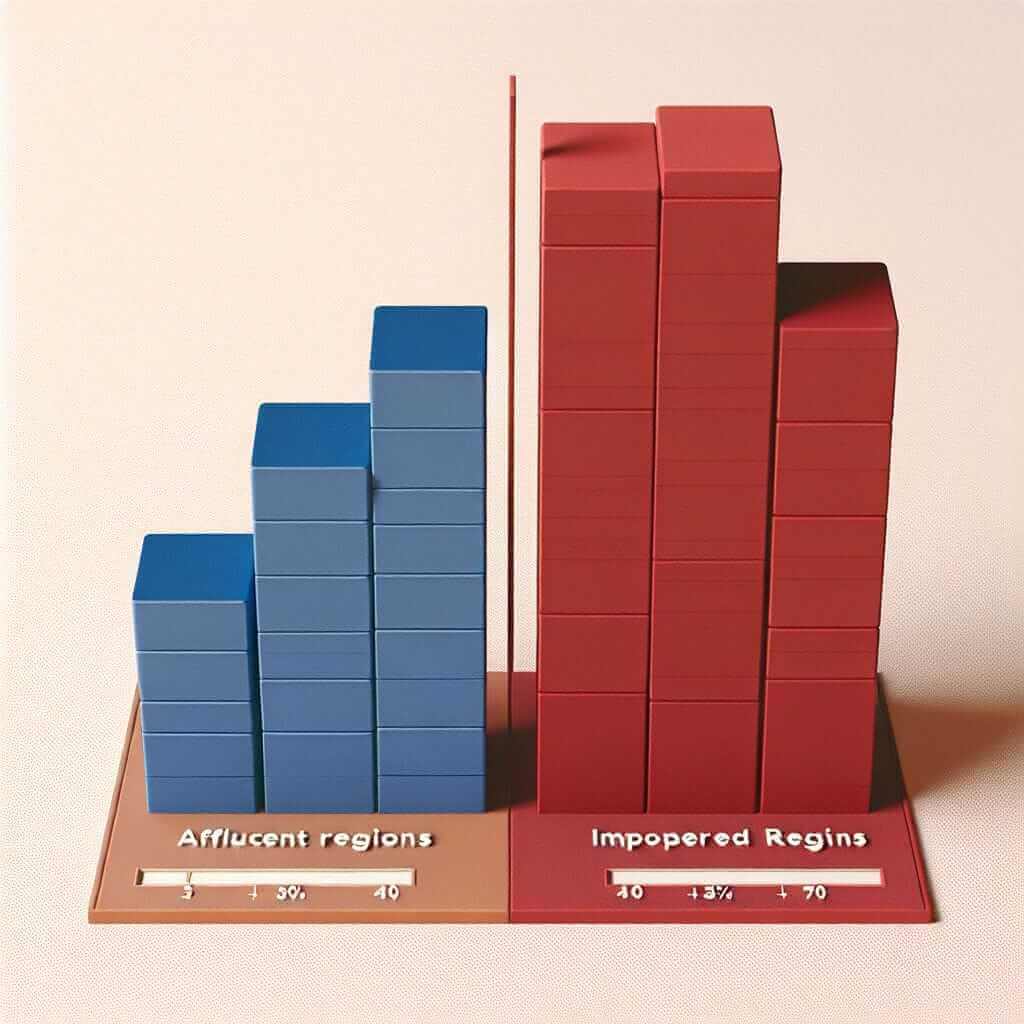Economic inequality has become a prevalent issue in many societies and has far-reaching implications, particularly on education access. This topic has appeared on various IELTS Writing Task 2 exams and is likely to continue being relevant in the future due to its growing importance in global discussions. In this article, we will select a sample essay question, analyze it, provide a complete model answer, and offer valuable tips and vocabulary for students preparing for the IELTS Writing Task 2.

Sample Essay Question: Economic Inequality and Education
“Some people believe that economic inequality has a significant impact on access to education. To what extent do you agree or disagree?”
Analyzing the Essay Question
This essay prompt is a common type in IELTS Writing Task 2 and requires the test-taker to present their opinion on the extent to which they agree or disagree with the statement. Key points to consider include:
- Identifying the relationship between economic inequality and access to education.
- Providing real-world examples and evidence to support your argument.
- Structuring your essay to present a clear, coherent, and balanced viewpoint.
Model Answer
“Some people believe that economic inequality has a significant impact on access to education. To what extent do you agree or disagree?”
Economic inequality undeniably affects various facets of society, and one of the most critical areas impacted is education access. I strongly agree that economic disparities have a profound effect on individuals’ ability to attain education, and I will elucidate the reasons for this in the following paragraphs.
Firstly, economic inequality often translates into a lack of resources for lower-income families, making it challenging for them to afford quality education. For instance, tuition fees for private schools or higher education institutions can be prohibitively expensive for families living in poverty. Consequently, children from disadvantaged backgrounds are often forced to attend underfunded public schools, which might lack essential facilities, experienced teachers, and enriching extracurricular activities. This disparity in educational resources results in a significant gap in academic performance between affluent and impoverished students.
Furthermore, economic inequality can lead to a cycle of limited educational opportunities and perpetuate poverty. Children from low-income families are less likely to receive the support and encouragement needed to pursue higher education or vocational training. This lack of education reduces their chances of securing well-paying jobs in the future, thereby continuing the cycle of economic hardship.
Additionally, economic inequality can also affect psychological aspects of learning. Students from less privileged backgrounds may experience stress or anxiety related to their financial situations, which can hinder their academic achievements. Without adequate support systems, these students may struggle to excel in their studies, leading to higher dropout rates and fewer opportunities for upward mobility.
However, it is important to acknowledge that some measures can be taken to mitigate the adverse effects of economic inequality on education. Government policies aimed at providing scholarships, financial aid, and better funding for public schools can help bridge the gap. Community initiatives and non-profit organizations also play a crucial role in supporting underprivileged students by offering tutoring, mentoring, and other educational resources.
In conclusion, economic inequality significantly impacts access to education, creating wide disparities in educational resources, perpetuating cycles of poverty, and affecting students’ mental well-being. While some measures can help alleviate these issues, addressing economic inequality at its root is essential for ensuring equal educational opportunities for all. (Word count: 340)
Tips for Writing about Economic Inequality and Education
When writing essays on topics like economic inequality and education, consider the following tips:
- Use Specific Examples: Provide concrete examples to back up your points. This not only strengthens your argument but also makes your essay more relatable and persuasive.
- Balanced Viewpoint: While it is important to present a clear stance, acknowledging counterarguments and providing balanced viewpoints can demonstrate critical thinking and depth of analysis.
- Clear Structure: Ensure your essay follows a logical structure with a clear introduction, body paragraphs, and conclusion. This enhances readability and coherence.
Key Vocabulary
Here are some critical vocabulary terms used in the model essay:
- Disparities (n.) /dɪˈspærɪtiz/: a great difference.
- Prohibitively (adv.) /prəˈhɪbɪtɪvli/: in a way that forbids or prevents something.
- Underfunded (adj.) /ˌʌndərˈfʌndid/: not having sufficient funding.
- Perpetuate (v.) /pərˈpetʃueɪt/: to make something continue indefinitely.
- Upward Mobility (n.) /ˌʌpwərd moʊˈbɪləti/: the ability to move to a higher social or economic position.
- Scholarships (n.) /ˈskɒlɚʃɪps/: a grant or payment made to support a student’s education.
- Tuition Fees (n.) /tjuːˈɪʃən fiz/: the money paid for instruction at a school or college.
- Extracurricular (adj.) /ˌekstrəkəˈrɪkjələr/: (of activities) pursued in addition to the normal course of study.
Conclusion
In summary, the effects of economic inequality on education access are a crucial topic for IELTS Writing Task 2. This model answer provides a comprehensive approach to discussing the issue, utilizing specific examples and balanced arguments. Future exam questions may include topics such as “The role of government in reducing economic disparities in education” or “The impact of economic policies on education access.” Practicing with these variations will better prepare you for the exam.
By understanding and applying the tips and vocabulary provided, students can enhance their writing skills and improve their IELTS writing band score. Keep practicing and refining your essays to achieve success in your IELTS exam.